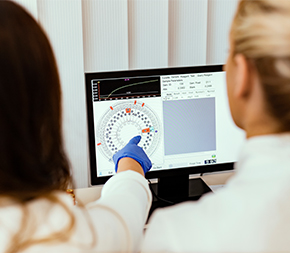In this Article

While there is no national educational standard for pharmacy technicians—some jobs require only a high school diploma or GED—the field is trending toward requiring postsecondary education or training. This can be done on the job, in a certificate or diploma program, or with an associate degree.
Your education can continue after you land a job, too. You may choose to become certified, and later you can earn specialty certificates in niche topics.
“To succeed as a pharmacy technician, you should be someone who craves learning something new all the time,” explains Glen Gard, CPhT, CSPT, director of sterile compounding compliance at the infusion services company Option Care Health.
Your options for jobs, and your responsibilities within those roles, will likely depend on your education, too.
Certificate/Diploma Programs
A certificate or diploma program can provide the foundation you need to become a pharmacy technician. These programs are condensed and include only the fundamentals so you can finish as soon as possible. They prepare you to begin working—and you’ll want to choose one that can lead to taking a certification exam.
Prerequisites:
High school diploma or GED. Most programs require exams that show you meet standards for math and English. Many also require a background check and/or drug screening.
Curriculum:
Pharmacy calculation, pharmacy law, simulated and/or hands-on experience putting knowledge into practice
Time to complete:
4-5 months, or 2 semesters
Who is a good match:
Those who want to become certified pharmacy technicians—quickly
Associate Programs
An associate program provides a more finely tuned course line-up and a more in-depth education. It can also position you for further education should you want to pursue more advanced roles in healthcare.
Prerequisites:
High school diploma or GED. Some programs also require SAT or ACT scores and prerequisite courses, such as college-level math.
Curriculum:
Pharmacy calculation, healthcare law and ethics, diseases, pharmacy practices, pharmacology
Time to complete:
Two years
Who is a good match:
Those who have already earned some college credit, those who hope to earn a bachelor’s degree later, and those who aim to work toward another healthcare career such as a pharmacist
Can I Study to Become a Pharmacy Technician Online?
Absolutely. Many pharmacy technician programs are offered either partly online or entirely online. These options are flexible and can include both synchronous (live) and asynchronous (pre-recorded) lessons.
People who need to adapt their education to fit with other responsibilities such as caregiving or work find they can complete online programs at their own pace. Online programs also eliminate restrictions around geography: You can enroll in an online program from anywhere in the country, so long as you have internet access.
Some online programs have the option for hands-on practice and externships at a local pharmacy, under the supervision of a pharmacist.
Both associate and diploma/certificate programs are offered online, so the time to complete online study depends on which you choose and how quickly you move through the material.
What to Look for in a School
Most important: Verify that the school and program are accredited. “Ensure the program is approved by credentialing organizations—such as PTCB and NHA,” Gard says. “That way you don’t complete a program and realize it’s unacceptable—and a waste of money.”
Accreditation is crucial for any postsecondary education. Without it, a school can’t give out federal financial aid, and you won’t be able to transfer credits to an accredited school if you decide to pursue more education later.
In the case of pharmacy technicians, the Pharmacy Technician Certification Board (PTCB) and the National Healthcareer Association (NHA) require the completion of an approved training or education program before you can take the certification exam.
Not all states require pharmacy technicians to be certified, but it is becoming the industry norm. To increase your career options and future salary, choose the right program for you.
Getting Certified
Your main—and first available—option for certification is the Certified Pharmacy Technician (CPhT) designation. You can earn a CPhT from either the PTCB or the NHA.
To become a certified pharmacy technician, you must complete an approved training program and pass the standardized exam. To maintain certification, you’ll complete ongoing education credits and apply for renewal every two years.
You will have more advanced options for pharmacy technician certifications as you gain experience. You can earn the designation Certified Compounded Sterile Preparation Technician (CSPT), a credential for people working in compounding pharmacies, or the Advanced Certified Pharmacy Technician (CPhT-Adv), which demonstrates greater mastery than the CPhT.
Specialty Certifications
As you learn more about education required to become a pharmacy technician, you might notice some confusing terms. There is, in fact, a difference between being “certified as a pharmacy technician” and “earning a specialty certification.”
Certified pharmacy technicians have acronyms behind their names—CPhT, CSPT, and/or CPhT-Adv. These designations must be renewed every two years. Renewals require completion of 20 hours of continuing education credits and a small fee.
On the other hand, you can earn a certificate from a certificate program, which shows your specialty in a particular aspect of the field. These do not have to be renewed.
Further, you must have earned a combination of certifications and certificate programs to become an Advanced Certified Pharmacy Technician.
Specialty certificate programs are offered by the PTCB. Some popular certificates include:
Medication History Certificate
Technician Product Verification Certificate
Hazardous Drug Management Certificate
Billing and Reimbursement Certificate
Controlled Substances Diversion Prevention Certificate
Immunization Administration Certificate
Salary
Your salary as a pharmacy technician may depend on where you work, your experience and education, and more.
The good news is that, as a pharmacy technician, you can build a career that allows you to help others and earn a healthy salary.

Written and reported by:
Catherine Ryan Gregory
Contributing Writer

With professional insight from:
Glen Gard, CPhT, CSPT
Director of Sterile Compounding Compliance, Option Care Health